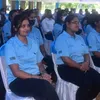[HS Exclusive] These women HEMM operators at Tata Steel are breaking stereotypes, one machine at a time
Under its flagship Women@Mines programme, Tata Steel has onboarded 38 women Heavy Earth Moving Machinery (HEMM) operators at its mines in West Bokaro and Noamundi. Five women tell HerStory why they chose to take up an unconventional career.
Most of them don’t know to ride a bicycle, but that has not deterred them from learning to operate Heavy Earth Moving Machinery (HEMM), a skill that requires both physical abilities and mental fortitude.
They know they are making history, but the 38 HEMM operators at Tata Steel’s mines in West Bokaro Division and Noamundi believe nothing is impossible.
The women have been onboarded as part of Tata Steel’s flagship programme, Women@Mines, which aims to provide technical training to unskilled women workers and enable them to work in core jobs at mines. The selection process consisted of a written test followed by a personal interview.
The selected candidates at the West Bokaro division are undergoing intensive training for a year to hone their skills as HEMM operators. After completing their training, these women will be deployed as operations assistants to operate HEMM at Quarry SE, including dumper, dozer, shovel, excavator, and drill.
Atrayee Sanyal, Vice President, Human Resource Management, , says: “Tata Steel has always provided career opportunities to talented youth from the community, and Women@Mines is yet another milestone in this journey. Focused on industry-wide efforts to foster a diverse and inclusive culture, Tata Steel is making sure it provides a safe and an enabling environment to its workforce.”
The young women who are part of Women@Mines are working in what is traditionally considered a male domain, taking on shifts and operating heavy machinery. They are proud to be a part of the Tata legacy, which they believe recognises achievements and offers them opportunities to grow.
D B Sundara Ramam, Vice President, Raw Materials, Tata Steel, says: “Our Women@Mines initiative intends to provide a wider career choice to women who wish to be a part of Tata Steel’s growth story. The successful deployment of the first batch of 22 women at the Noamundi iron mine in 2019 had given us immense confidence to push for greater women participation in a sector that has hitherto been considered a male domain. We will continue to work towards making mining an attractive and rewarding proposition for young talent.”
Five women HEMM operators, three from West Bokaro and two from Noamundi, join HerStory in a conversation about choices, their “unconventional” jobs, and their plans for the future.
Deepika Kumari, West Bokaro

Twenty-two-year-old Deepika Kumari wanted to become a doctor, but fate had other plans. When she got a BDS seat, she decided to give up her medical dreams and look for something else. She came across the vacancy for a HEMM operator and, on a lark, decided to apply.
“I cracked the written exam and an interview, and I knew this was the job for me after a visit to the mine,” she says.
Her family was taken aback by her decision because she had always wanted to be a doctor, but were supportive. Her neighbours asked if she had lost her mind, but she paid no heed and stuck to her decision.
Currently, in her training period, Deepika is learning about operating different types of machines through fieldwork and simulators. “I don’t mind the physical exertion at all. The training period has been fascinating as we are learning things from the ground level.”
Deepika feels that a job should not be restricted by gender. “Anyone should be able to pursue any field she likes,” she says.
Kiran Mundari, Noamundi
Before joining the Women@Mines programme as a HEMM operator, Kiran worked in the mines control room. With a diploma in mechatronics, she is raring to go.
Her parents are happy too; she stays close to the mine.

“When I came to know Tata Steel was hiring HEMM operators, I immediately applied and cleared both the written exam and interview. During the training period, we started from the basics – learning how to drive through a simulator. We then received experience in different departments – dumper, shovel, etc. We spent seven months training in theory and over two months in the field,” she says.
She met with some scepticism from family and friends. “I was told that it’s not a job for women. But my parents have been supportive of my decision,” she adds.
Kiran is all praise for the management for their support during the training period. “The operators are with us at every step and goad us to operate the machines ourselves so that we get rid of any fear we may have. We are now more confident than we were in the beginning,” she says.
Kiran wants to “grow” in the company and also continue her education.
“When others say you can’t do something, you must accept the challenge and show them you can do it.”
Punam Priti Singh, West Bokaro

Twenty-six-year-old Punam has a master’s degree in chemistry but chose to be a HEMM operator. She says she always wanted to stand out in the crowd, and this was her way of proving to the world that “unconventional was the way to be”.
“I always wanted to do something different, something that no one had tried earlier so I could be an example to other girls who are hesitant to take up jobs in male-dominated fields,” she says.
Punam received mixed reactions. While her family was aware of her ambitions, the others soon came around.
“The training period is going on quite well. I don’t think the job is easy or difficult – it requires skills like focus, complete concentration, and presence of mind to face any situation or make a decision when the going gets tough,” she adds.
She’s not worried about the physical nature of the job either. She aims to fulfill her responsibilities to the best of her abilities and seize all opportunities to grow.
“How we choose to work is in our hands. We must motivate ourselves to take up any challenge, break every stereotype and move forward.”
Priya Mishra, Noamundi

Priya got to know about the HEMM operator job from her father, who works at Tata Steel. People from all three generations before her have worked in the organisation, so it was a given that she would try to.
“When I first visited the mine, it felt like moving from a comfort zone from the ground level to underground, and that was a bit of a challenge. Operating heavy machinery was a difficult task as well as I didn’t even know to ride a two-wheeler. The fear soon gave way to confidence with immense support from the trainers and other staff,” she says.
Priya is excited to take up the job full time after the training period. She has no qualms about working in shifts and is proud that she is following in her forefathers' footsteps.
“Women can choose any field they want. There’s nothing they cannot do. They just need to accept the challenges and prove themselves,” she says.
Sushmita Mandal, West Bokaro

Soon after she completed Class 10, Sushmita Mandal applied for jobs at Tata Steel. Her father works in the organisation, and she has seen first-hand the benefits, opportunities, and growth that employees at Tata Steel get.
“I was unable to qualify in the written tests. So, I went on to do my BCom in management honours, a master’s in human resources, and a BEd in economics,” she says.
When the HEMM opportunity came up, Sushmita grabbed it. But she feels reactions from people around her were “discouraging and weird”. They asked her father, “Ladki hai, kaise karegi, kaise allow kar rahe hain? (She’s a girl. How can she do this job? How are you allowing her to do it?”
Her father’s reaction was straightforward. “Jab ladkiyaan pilot ban sakti hai, bus aur train chala sakti toh yeh kyoon nahin kar sakti? (when women can fly planes, drive buses and trains, why can’t they do this job?”
Encouraged by his support, Sushmita passed the written exam and interview, and joined Tata Steel’s West Bokaro division.
“From day one, the training period has been fascinating. Tata Steel has a unique work culture that values discipline and respects and recognises hard work. I have grown from Sushmita to Sushmitaji to Sushmita Ma’am, and that’s a huge honour,” she says.
Learning things literally from the ground up, Sushmita is all set to complete her training and joining the mine full time.
Her advice to other girls who are hesitant to take up “different careers” is simple.
“Don’t judge a work before actually doing it. Jahan chaah hai, wahan raah hai (where there is a will and a desire, there is a way). You can do anything if you put your mind to it. The sky is the limit.”
Edited by Teja Lele


![[HS Exclusive] These women HEMM operators at Tata Steel are breaking stereotypes, one machine at a time](https://images.yourstory.com/cs/4/8e7cc4102d6c11e9aa979329348d4c3e/tata-steel-1631787650769.png?mode=crop&crop=faces&ar=2%3A1&format=auto&w=1920&q=75)





